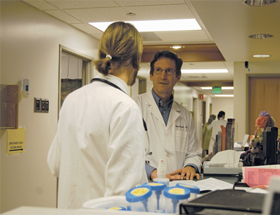Letters to the Editor
Readers respond about SGR fix, sinusitis approaches, and hospitalist##ndash;physician communication.
SGR fix must consider patients
I thank Dr. Kinsman [“Letters to the Editor: Fed up with SGR, “ ACP Internist, January 2011] for bringing the Denver Post's November 2010 article to our attention and for emphasizing the frustrations and pain that sustainable growth rate (SGR) cuts cause. ACP has always advocated for a permanent fix to the SGR. A bill to permanently wipe off the SGR-related deficit failed to pass because of the demand that such measures be offset by cuts elsewhere. In the absence of a permanent antidote, the next best solution is a temporary reprieve.
Legislation to correct SGR's ills is painfully slow. Some feel it may be hastened by refusing to take Medicare, or by otherwise inconveniencing Medicare recipients. However, such actions harm our patients; alienate seniors, whose clout as an advocacy group is considerable; and break the societal contract that has given physicians their prestigious position in and trust from society.
Strikes are both unethical and risky. ACP policy, as outlined in the ACP Ethics Manual, Fifth Edition, says, “Physicians should not engage in strikes, work stoppages, slowdowns, boycotts, or other organized actions that are designed, implicitly or explicitly, to limit or deny services to patients that would otherwise be available.” ACP's Ethics, Professionalism and Human Rights Committee and the Center for Ethics and Professionalism recently published a case study titled “Physician work stoppages and political demonstrations: Economic self-interest or patient advocacy? Where is the line?”, available online. As this study tries to illustrate, Grandma (her walker included) and all of our patients come first.
SGR is broken and we must find appropriate ways to fix it without hurting the very people we are pledged to help.
Kesavan Kutty, MACP
Chair, Ethics, Professionalism and Human Rights Committee
American College of Physicians
A different approach
Your extensive review of sinusitis [“Miserable symptoms mark chronic sinusitis, “ ACP Internist, January 2011] did not mention a likely cause of at least some of the associated symptoms: blowing. Perceiving nasal congestion, many people blow their noses, often hard and frequently. Positive pressure within the nasal cavity, however, will not only be directed outward but will also impact the Eustachian tube and the osteomeatal complex. Sniffing, on the other hand, creates negative pressure, thereby reducing sinus congestion and enabling the normal distal progression of nasal and sinus mucus.
Sniffing, sometimes with steam inhalations, rather than blowing should, therefore, be the preferred initial treatment for sinusitis symptoms, and the common cold as well. Much of the diagnostic and therapeutic attention your article mentions may well be avoidable.
Martin Terplan, FACP
San Francisco
Communication requires dedication
I was surprised by your article [“PCPs, hospitalists work at communication, “ ACP Internist, January 2011] reporting that communication between hospitalists and physicians responsible for outpatient care is such a problem and requires so much time, energy and discussion to figure it out.
Fifty years ago I was a resident at the University of Iowa Hospitals in Iowa City, where we residents were the hospitalists who took care of patients brought to us from all over the state by a large number of university hospital ambulances every day.
There we dictated out history and physicals and discharge summaries to centrally located recording machines. We were required to do our dictation within 12 hours of admission and discharge. Our reports were transcribed, returned to us for editing and our signatures and then sent to the primary care physicians in the hinterlands by mail. The recording machines were quite primitive and all the records were in paper form. There were always some physicians who did not do their dictation within the required time, but the system worked fairly well.
Now we have sophisticated recording devices that are often wireless, voice recognition, and instantaneous fax transmission and e-mail. If physicians dictate their reports in a timely fashion, not weeks or months later, as frequently happens, these reports will be available to be transmitted electronically to the physicians outside of the hospital within 24 to 48 hours after discharge.
I believe that the admission history and physical, discharge summary, diagnostic imaging reports, all laboratory and pathology reports and surgical reports should always be sent to the physician in charge of outpatient continuing care. If hospitalists and their institutions cannot meet these requirements in a timely fashion, they should be encouraged to improve their performance, and if this fails, reprimanded or more.
This is a simple problem compared to most of our health care problems in this country, with a simple solution that requires some discipline and a desire to provide the patient with the best of medical care.
John L. Friedman, FACP
Phoenix



